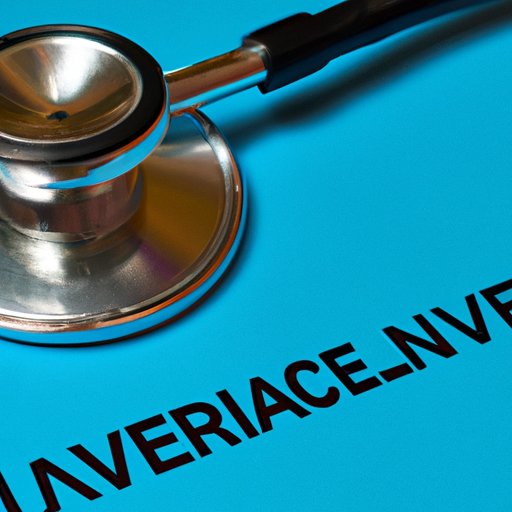
Introduction
Universal healthcare is a healthcare system that provides all citizens with access to healthcare services regardless of their ability to pay. It is an issue of great importance in America, as access to healthcare has become increasingly difficult for many Americans. Lack of access to healthcare has resulted in delayed medical treatment, and in some cases, death.

The State of Healthcare in America: Exploring the Pros and Cons of Universal Coverage
The American healthcare system is highly complex and fragmented. It is a system that combines both public and private sector providers, and has been a source of debate for many years. There are both pros and cons to implementing a universal healthcare system.
Pros of Universal Healthcare
Increased Access to Healthcare Services
Universal healthcare guarantees access to all individuals, regardless of their socioeconomic status. It means that everyone has the right to medical services, making healthcare truly universal. This will especially benefit the poor, uninsured, and underinsured population in America.
Lower Healthcare Costs
Healthcare costs in America are extremely high compared to other countries with universal healthcare. This is largely due to a lack of price controls, administrative costs and overpricing. The implementation of a universal healthcare system can help to reduce these costs.
Improved Health Outcomes
Studies show that countries with universal healthcare systems have better health outcomes compared to countries without universal healthcare. This can be attributed to increased access to medical services, and better preventative care.
Cons of Universal Healthcare
Higher Taxes
One of the biggest obstacles to implementing universal healthcare is the cost. It requires a significant amount of funding, and this funding is typically raised through taxes. This is a concern for many Americans, as it may lead to increased tax burdens.
Longer Wait Times for Certain Procedures
A common criticism of universal healthcare is that it results in longer wait times for certain medical procedures. Patients may have to wait longer to receive non-life-threatening procedures, such as hip replacements, due to high demand and the need to manage costs.
Restrictions on Choice of Healthcare Providers
Another criticism of universal healthcare is that it may limit an individual’s choice of healthcare providers. Under this system, providers may be incentivized to provide only basic care to remain under budget, which could lead to a decrease in quality of care.
Why the United States Has Yet to Adopt a Universal Healthcare System
Historical Context
The United States has a long history of opposition to universal healthcare. This can be attributed to a number of factors, including a belief in individual responsibility in healthcare, opposition to government intervention in personal matters, and an emphasis on free-market solutions to healthcare.
Political Opposition
The political opposition to universal healthcare in America is significant. There are many individuals, including politicians, who are against the idea of universal healthcare due to ideological and financial reasons, that it hinders market competition, leads to higher taxes, and government control.
Influence of Special Interest Groups
Special interest groups, such as insurance companies, pharmaceutical companies, and healthcare providers, have a vested interest in maintaining the status quo of the American healthcare system. They have spent billions of dollars lobbying against healthcare reform, and this has led to a reluctance to change the system.
Is Universal Healthcare the Solution to America’s Healthcare Problems?
Arguments for Universal Healthcare
Proponents of universal healthcare argue that it is the best way to provide affordable, quality healthcare to all Americans. It ensures that everyone has access to medical services, regardless of their socioeconomic status.
Counterarguments against Universal Healthcare
Opponents of universal healthcare argue that it will lead to higher taxes, excessive waiting times, and loss of personal freedom. They also argue that it will lead to poor quality of care, increase healthcare costs and pose a threat to the free market, leading to socialized medicine.
Overview of Past Attempts and Potential Obstacles
Many attempts have been made to introduce universal healthcare in America, but all have been met with political opposition and failure. Political polarization has complicated the process, and implementing universal healthcare would require significant political will to overcome.
Understanding the Different Forms of Universal Healthcare and Their Possible Impacts in the US
Single-Payer System
A single-payer healthcare system is a system in which a single government entity is responsible for paying for all medical expenses. This takes the burden of hefty medical expenses off of patients, and provides a level of care to everyone, regardless of their ability to pay.
Multi-Payer System
In a multi-payer system, multiple insurance plans provide coverage to patients. This allows for greater flexibility in choice of plans and freedom in decision-making. There is also a greater degree of competition among insurers, resulting in lower costs and improved quality of care.
Mixed-Market System
A mixed-market system is a hybrid of the single-payer and multi-payer systems. In this system, the government would provide basic coverage, while allowing for private insurers to provide additional insurance to those who can afford it.
Comparison of their Potential Benefits and Drawbacks
The single-payer system offers universal coverage and reduces costs. However, it may lead to longer wait times, and limitations on choice of healthcare providers. The multi-payer system provides greater freedom of choice but is more expensive and doesn’t provide coverage to those who are unable to afford insurance. The mixed-market system offers a combination of pros and cons that can help mitigate negative impacts without sacrificing good health coverage.
The Politics of Universal Healthcare in America: A Historical Perspective
Overview of Past Efforts to Implement Universal Healthcare
Historically, multiple attempts have been made to introduce universal healthcare in America. The most well-known attempt was under President Obama when the Affordable Care Act was put into place. Over the years, various proposals to expand healthcare coverage have been stymied by political opposition or societal and public pressures.
Political Obstacles and Opposition
Politically, universal healthcare has been met with significant opposition, primarily due to concerns over the cost and the potential interference into people’s personal healthcare decisions. Additionally, perceived attacks on the private sector and an effort to discredit the entire private insurance and healthcare industry are a significant concern for some sectors of society.
Influence of Healthcare Interest Groups
Special interest groups, including pharmaceutical companies, insurance companies, and healthcare providers, wield significant power and money in the healthcare industry. They have contributed heavily to political campaigns of lawmakers, and have lobbied strongly against healthcare reform and have been one of the main obstacles for push for a universal healthcare system in America.
Comparing the US Healthcare System to Other Countries with Universal Healthcare
Overview of the Healthcare Systems in Other Countries
Many countries around the world have implemented universal healthcare. These include the United Kingdom, Canada, Australia, Japan, Norway, Sweden, among other countries.
Analysis of Their Effectiveness and Key Features
Studies suggest that countries with universal healthcare have better health outcomes, longer life expectancies, and lower healthcare costs. It also leads to increased access to medical services, making it easier for people to receive care for their health problems.
Implications for the US Healthcare System
The US healthcare system has unique challenges compared to other countries with universal healthcare systems. Its development of a private insurance structure and its focus on market-driven approach makes it hard to change. However, examining other universal healthcare models can help in identifying successful methods for implementation and potentially lead to better healthcare outcomes in America.
Examining the Financial Implications of Implementing Universal Healthcare in the United States
Cost of the Current System
The current American healthcare system is expensive, with high costs for both patients and providers. The cost of healthcare in America is among the highest in the world, largely due to administrative costs, and overpricing by providers.
Potential Cost Savings of Implementing Universal Healthcare
Implementing universal healthcare presents potential cost savings. Studies suggest that the implementation of a single-payer or mixed-market system could save billions of dollars annually if implemented effectively.
Potential Sources of Funding
Potential sources of funding for universal healthcare include taxes, government funding, redirection of healthcare resources, and reallocating of existing healthcare resources. This would enable a quality healthcare system for everyone in the United States without crippling them financially.
Conclusion
Summary of Key Points
The United States currently does not have a universal healthcare system. It has a highly complex and fragmented healthcare system that combines both public and private sector providers. While there are both pros and cons to adopting a universal healthcare system, its implementation in America has been difficult due to political opposition and the influence of healthcare special interest groups. Implementing a universal healthcare system would require significant political will and addressing societal challenges.
Opinion on the Feasibility and Desirability of Implementing Universal Healthcare
The implementation of a universal healthcare system is a difficult and complicated process. And there is a need to address many factors that could hinder its implementation effectively. From a financial, practical, societal and humanistic standpoint, it is feasible and desirable for the US to adopt a universal healthcare system while balancing the need for quality healthcare provision and personal freedom in decision-making.
Final Thoughts and Recommendations
The United States has grappled with the idea of implementing a universal healthcare system for many years, with little success. The provision of affordable healthcare to all citizens is a critical social issue that needs to be addressed, and policymakers should seriously consider viable ways to address this issue for the greater good of society.





